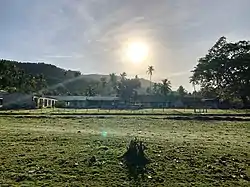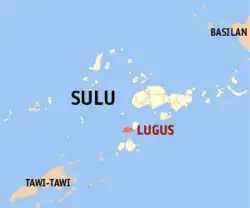Lugus, Sulu
Lugus, officially the Municipality of Lugus (Tausūg: Kawman sin Lugus; Tagalog: Bayan ng Lugus), is a 5th class municipality in the province of Sulu, Philippines. According to the 2020 census, it has a population of 29,043 people.[3]

Aerial view of Lugus Island east coast, date unknown
Lugus
لوڬوس | |
|---|---|
| Municipality of Lugus | |
 Mangkallay Elementary School at sunrise | |
 Map of Sulu with Lugus highlighted | |
OpenStreetMap | |
.svg.png.webp) Lugus Location within the Philippines | |
| Coordinates: 5°42′N 120°49′E | |
| Country | Philippines |
| Region | Bangsamoro Autonomous Region in Muslim Mindanao |
| Province | Sulu |
| District | 2nd district |
| Barangays | 17 (see Barangays) |
| Government | |
| • Type | Sangguniang Bayan |
| • Mayor | Hadar M. Hajiri, Al-haj. |
| • Vice Mayor | Almedzar A. Hajiri |
| • Representative | Munir N. Arbison Jr. |
| • Municipal Council | Members |
| • Electorate | 18,720 voters (2022) |
| Area | |
| • Total | 133.04 km2 (51.37 sq mi) |
| Elevation | 8.0 m (26.2 ft) |
| Highest elevation | 487 m (1,598 ft) |
| Lowest elevation | 0 m (0 ft) |
| Population (2020 census)[3] | |
| • Total | 29,043 |
| • Density | 220/km2 (570/sq mi) |
| • Households | 5,044 |
| Economy | |
| • Income class | 5th municipal income class |
| • Poverty incidence | 75.53 |
| • Revenue | ₱ 105.7 million (2020) |
| • Assets | ₱ 125.5 million (2020) |
| • Expenditure | ₱ 96.83 million (2020) |
| • Liabilities | ₱ 38.07 million (2020) |
| Service provider | |
| • Electricity | Sulu Electric Cooperative (SULECO) |
| Time zone | UTC+8 (PST) |
| ZIP code | 7411 |
| PSGC | |
| IDD : area code | +63 (0)68 |
| Native languages | Tausug Tagalog |
| Website | www |
Geography
Barangays
Lugus is politically subdivided into 17 barangays. Each barangay consists of puroks while some have sitios.
- Alu Bus-Bus
- Alu-Duyong
- Bas Lugus
- Gapas Rugasan
- Gapas Tubig Tuwak
- Huwit-huwit Bas Nonok
- Huwit-huwit Proper
- Kutah Parang
- Laha
- Larap
- Lugus Proper
- Bas Mangkallay
- Mantan
- Pait
- Parian Kayawan
- Sibul
- Tingkangan
Climate
| Climate data for Lugus, Sulu | |||||||||||||
|---|---|---|---|---|---|---|---|---|---|---|---|---|---|
| Month | Jan | Feb | Mar | Apr | May | Jun | Jul | Aug | Sep | Oct | Nov | Dec | Year |
| Average high °C (°F) | 27 (81) |
27 (81) |
27 (81) |
28 (82) |
29 (84) |
28 (82) |
28 (82) |
28 (82) |
28 (82) |
28 (82) |
28 (82) |
28 (82) |
28 (82) |
| Average low °C (°F) | 27 (81) |
26 (79) |
27 (81) |
27 (81) |
28 (82) |
28 (82) |
28 (82) |
28 (82) |
28 (82) |
28 (82) |
28 (82) |
27 (81) |
28 (81) |
| Average precipitation mm (inches) | 184 (7.2) |
143 (5.6) |
144 (5.7) |
136 (5.4) |
240 (9.4) |
301 (11.9) |
272 (10.7) |
253 (10.0) |
183 (7.2) |
265 (10.4) |
246 (9.7) |
208 (8.2) |
2,575 (101.4) |
| Average rainy days | 18.6 | 15.8 | 16.9 | 15.7 | 23.3 | 24.2 | 24.6 | 23.2 | 20.5 | 23.0 | 22.2 | 20.4 | 248.4 |
| Source: Meteoblue (modeled/calculated data, not measured locally)[5] | |||||||||||||
Demographics
| Year | Pop. | ±% p.a. |
|---|---|---|
| 1990 | 14,907 | — |
| 1995 | 16,330 | +1.72% |
| 2000 | 18,839 | +3.11% |
| 2007 | 21,650 | +1.94% |
| 2010 | 19,839 | −3.13% |
| 2015 | 21,897 | +1.90% |
| 2020 | 29,043 | +5.71% |
| Source: Philippine Statistics Authority[6][7][8][9] | ||
Economy
References
- Municipality of Lugus | (DILG)
- "2015 Census of Population, Report No. 3 – Population, Land Area, and Population Density" (PDF). Philippine Statistics Authority. Quezon City, Philippines. August 2016. ISSN 0117-1453. Archived (PDF) from the original on May 25, 2021. Retrieved July 16, 2021.
- Census of Population (2020). "Bangsamoro (BARMM)". Total Population by Province, City, Municipality and Barangay. Philippine Statistics Authority. Retrieved 8 July 2021.
- "PSA Releases the 2018 Municipal and City Level Poverty Estimates". Philippine Statistics Authority. 15 December 2021. Retrieved 22 January 2022.
- "Lugus, Sulu : Average Temperatures and Rainfall". Meteoblue. Retrieved 31 January 2019.
- Census of Population (2015). "ARMM – Autonomous Region in Muslim Mindanao". Total Population by Province, City, Municipality and Barangay. Philippine Statistics Authority. Retrieved 20 June 2016.
- Census of Population and Housing (2010). "ARMM – Autonomous Region in Muslim Mindanao" (PDF). Total Population by Province, City, Municipality and Barangay. National Statistics Office. Retrieved 29 June 2016.
- Censuses of Population (1903–2007). "ARMM – Autonomous Region in Muslim Mindanao". Table 1. Population Enumerated in Various Censuses by Province/Highly Urbanized City: 1903 to 2007. National Statistics Office.
- "Province of Sulu". Municipality Population Data. Local Water Utilities Administration Research Division. Retrieved 17 December 2016.
- "Poverty incidence (PI):". Philippine Statistics Authority. Retrieved December 28, 2020.
- "Estimation of Local Poverty in the Philippines" (PDF). Philippine Statistics Authority. 29 November 2005.
- "2003 City and Municipal Level Poverty Estimates" (PDF). Philippine Statistics Authority. 23 March 2009.
- "City and Municipal Level Poverty Estimates; 2006 and 2009" (PDF). Philippine Statistics Authority. 3 August 2012.
- "2012 Municipal and City Level Poverty Estimates" (PDF). Philippine Statistics Authority. 31 May 2016.
- "Municipal and City Level Small Area Poverty Estimates; 2009, 2012 and 2015". Philippine Statistics Authority. 10 July 2019.
- "PSA Releases the 2018 Municipal and City Level Poverty Estimates". Philippine Statistics Authority. 15 December 2021. Retrieved 22 January 2022.
External links
 Media related to Lugus, Sulu at Wikimedia Commons
Media related to Lugus, Sulu at Wikimedia Commons- Lugus Profile at PhilAtlas.com
- Lugus Profile at the DTI Cities and Municipalities Competitive Index
- Philippine Census Information
- Local Governance Performance Management System
This article is issued from Wikipedia. The text is licensed under Creative Commons - Attribution - Sharealike. Additional terms may apply for the media files.